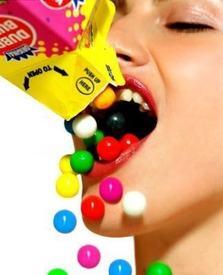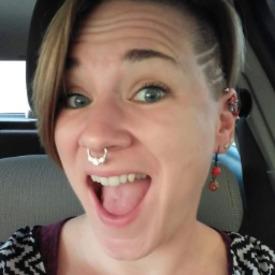Should we teach kids about calories?

melimomTARDIS
Posts: 1,941 Member
I am an adult, and I just learned how to count calories this past year. I knew foods had calories, but I didnt know how many a person should eat, how much we burn, or whatever.
As a parent, would it be helpful to teach our kids about calories? I encourage my kids to be active, eat healthfully, avoid soda/juice, about how junk foods are "sometimes" foods, and to only eat until they are full, not stuffed.
My children are young, so this is just teaching about healthful habits.
I wonder if in their later teens it might be helpful to learn to "budget" calories. Or would this trigger an eating disorder? Is it better to wait and see if a problem develops and then talk about it?
Edited to add- I mean a basic knowledge of calories,as a health tool, like learning to put on a condom or brush and floss teeth.
As a parent, would it be helpful to teach our kids about calories? I encourage my kids to be active, eat healthfully, avoid soda/juice, about how junk foods are "sometimes" foods, and to only eat until they are full, not stuffed.
My children are young, so this is just teaching about healthful habits.
I wonder if in their later teens it might be helpful to learn to "budget" calories. Or would this trigger an eating disorder? Is it better to wait and see if a problem develops and then talk about it?
Edited to add- I mean a basic knowledge of calories,as a health tool, like learning to put on a condom or brush and floss teeth.
0
Replies
-
Great question. Not sure how to answer that one. I have a four year old and we teach him the same things like junk food is an occasional treat, chocolate milk is a rarity (unless you're at grandma's and she doesn't care what we say), etc. I don't know how to approach this one with kids, particularly teenagers who are already pretty vulnerable. Curious to hear responses.0
-
Great question. Not sure how to answer that one. I have a four year old and we teach him the same things like junk food is an occasional treat, chocolate milk is a rarity (unless you're at grandma's and she doesn't care what we say), etc. I don't know how to approach this one with kids, particularly teenagers who are already pretty vulnerable. Curious to hear responses.
I love the unless they're at grandma's part, my mom is the same way w/ my kiddo!
To the original question, I would probably say no...I think teaching kids about why they should eat a variety of foods, why eating fruits and veggies is important, why you should eat when you're hungry not because you're bored, etc is important, but I don't think I would really talk about calories. Unless maybe it's a teenager, and you were careful not to demonize food an create an unhealthy relationship with food. Interesting question though.0 -
Yesterday my 14 year old was talking about how some foods were bad. He had 3 hamburgers last weekend (I didn't serve hamburgers 3 times, he was at a Father's Day Cookout and at a friends and the zoo) I took the opportunity to tell him there aren't bad foods. Moderation in all things. And I KNOW 3 hamburgers isn't moderation, but we eat pretty healthy most of the time. One weekend isn't going to hurt. We didn't talk about calories exactly, but I took this opportunity to talk about demonizing food, and how one slip up isn't going to hurt you, but when you slip up, get back into the healthy mode, don't eat more hamburgers. We went home and had chicken and broccoli.0
-
I was always taught to eat to be "healthy." We always had fresh fruit and veggies cut up in the fridge for snacks and not a lot of junk food. So I was always able to eat whatever I wanted at home, but it was rarely any type of processed food. I enjoyed going out to eat with friends and such, but because of how we ate at home it was always a treat. I've continued to eat that way into adulthood and it has worked out really well for me.0
-
I believe that knowledge is power, and the more a child understands the world and how it works, the more likely they are to be a successful, healthy, happy person. Many of our habits are formed in our childhood, so why not give them healthy eating habits?
However, I think it's important for parents to do the research so that they know the dietary and nutritional needs for their children before teaching them how to measure food, read labels, and count calories.0 -
Yes...and basic economics.
........and everything else that's "teachable."0 -
I think that children should be taught about food and nutrition in age appropriate ways. To me, that means a 5 year old should know chips are a sometimes food, and that vegetables etc have vitamins, which help them grow. As they get older (and have more control over their diet), I think more should be added.0
-
Right now we talk about healthy foods and moderation foods. I don't think they need to learn about calories at their ages (mine are 7 and 9), but I do think it's important that they learn about portion sizes and making good choices.
When I feel like it's time, then we'll branch out more.0 -
When she was little we taught my daughter that there were some foods that were snack foods, and she had to eat a fruit or veggie before snacking. We also told her at dinner she had to have some protein, a grain (or whatever kind of starch we had) and a veggie. If she didn't like the dinner we had, she made herself a turkey sandwich to hit all the essentials.
Now that she's a teenager I taught her how to read labels and to pay attention to servings sizes, but I have never told her how many calories she needs to eat daily or explained macros to her. She has a nice shape, and eats well, she's very active in sports so she eats quite a bit. I have told her that when she's not in sports later on in life that she'll have to ramp down her intake a bit.
If she starts to put on weight and asks for advice, I'll help her, but in the meantime I leave it as is.0 -
Great responses everyone! I know it's a touchy topic, so I appreciate this not turning into a train wreck.0
-
I don't think calories teaching is needed in most cases.
Stay active, eat when hungry not bored would cover most kids and adults for that matter.0 -
I prefer the always/sometimes/treat way of looking at it, and the healthy plate graph idea.
Kids don't need to be worrying about the numbers. Calories equate food with fat, and can lead to eating disorders in my opinion.
Focus more on getting all the nutrients for growth and health!0 -
Well, my mom always made VERY healthy food for me and always made me eat my veggies. She taught me the importance of nutrition and I was thin for awhile. Unfortunately, when I moved out and had freedom, I pigged out on all the food I couldn't have. However, every time I have dinner without a veggie, I hear my mom's voice say "where's your veggies!" so I got that going for me which is nice. lol
I think it's best to teach kids to eat certain foods in moderation and just accept the fact they WILL make their own choices later in life. The goal is to give them enough advice for them to be able to get back on their feet if they make a bad decision (or many). Mistakes are the most efficient way of learning!0 -
Mehhh you know, my parents never taught me about calories, and I was an active kid. I turned into a sedentary teen though-- and I think maybe it could have helped to know then about what is in food and its relationship with weight (we rarely had junk in the house and had farmers we got meat from and grew some veggies) so I just ate too much of the healthy stuff.
I dont think I would want to start super young put probably around puberty it would be good to talk to your kids doctor about to help them later in life.0 -
Or would this trigger an eating disorder? Is it better to wait and see if a problem develops and then talk about it?
Sure.
Just like it's better to not teach kids to read until they develop a problem from not being able to read.
:noway:
Knowledge doesn't "trigger" anything - there is no reason at all kids shouldn't learn responsible eating patterns, and in the modern world, that includes either watching their weight/body composition or watching their caloric intake. The sooner they have the tools, the better.0 -
No. People don't even really need to count calories. All we really need is to listen to our body's hunger and feed it accordingly but only with healthy things. We should teach them about nutrition and health, but not stress calories.0
-
I think that children should be taught about food and nutrition in age appropriate ways. To me, that means a 5 year old should know chips are a sometimes food, and that vegetables etc have vitamins, which help them grow. As they get older (and have more control over their diet), I think more should be added.
Agreed. My kids are 7 and 10, read boxes for fun, and ask lots of questions. So when they wanted to know what a calorie was, I explained it was a way to measure how much energy the food would give you. Too much energy means your body saves it for later. They aren't clueless, they know that people come in different sizes. They also learned about making healthy food choices in school, to emphasize the good example at home.0 -
I don't think teaching calorie counts to a child is necessary. If taught at an early age about heathy eating, moderation, and staying active, caloric intake shouldn't be an issue.0
-
No.0
-
My obese 6 year old is in a program for his weight. They aren't teaching me or him about counting calories, but instead are teaching him portion control. He eats 5 servings of fruits or veggies, 2-3 servings of lean protein, 6-9 servings of whole grains, and 2-3 servings of dairy. Also he is being taught 5, 2,1, 0. 5 servings of veggies/fruit, 2 hours or less of screen time, 1 hour of exercise and no sugar added drinks. I don't know who came up with this, but it is helping. He knows that with each meal he needs half of his plate to have fruit or veggies. We limit his screen time to 2 hours or less. He chooses what his exercise is. A lot of the time it is riding his bike outside. I think the biggest thing with weight is that kids are sitting down and not doing things. I don't think I will teach him how to count calories, but he will know about healthy fats, fruits, lean protein, and getting enough exercise.0
-
When my kids were young there were GO foods, WOAH foods, and STOP foods (green light, yellow light, red light) and we talked about the differences. You could have as much GO foods as you wanted, a little WAOH foods, & very little or no STOP foods & it worked well.
Now my 12 year old is in competitive sports & is starting to lift weights etc & we focus on getting plenty of protein, carbs & fat. He is starting to learn about macros too. My 8 year old just asked what a calorie was so that was an interesting discussion--she thought calories were bad but I explained they were energy & you need them.0 -
It's probably not good to let companies get a head start "teaching" kids.0
-
Free choice meat, fruit, veg, dairy, nuts. All high glycemic carbs and processed foods are portion controlled. We encourage eating the starch last. We like our fats and don't shy from bacon, ghee, cream or olive oil. Starting young all kids in our family, male or female learn to cook. Starting young all kids in our family are exposed to fine dining. Vegetable eating and athletic participation is compulsory. Ice cream and dark chocolate are always in the house but processed snack food is rarely on hand.0
-
Yes. We should ALSO teach them about manners, respect for themselves, one another, and all living things, actual real math (not common core), handwriting, proper grammar, spelling and punctuation.0
-
As someone who has struggled with disordered eating in the past, I'm going to say no. As yes, it could trigger an eating disorder. Cause one? No. But eating disorders are triggered easily. Making calories seem like the most important part of eating could definitely trigger one in a kid that might be more predisposed than another kid. After all, dieting is often a trigger for eating disorders and what do a lot of dieters have in common?
Calories.
I would say the most important thing to teach kids is that they should eat when they're hungry, stop when they're full, and stay active.0 -
Yes.
One thing I keep saying to people as I learn more and more about food and weight loss on this journey is that I really really wish I'd been raised to understand serving sizes and portion control.
Obviously we shouldn't teach calories as a way to frighten or shame kids, or give the idea that there are good vs bad foods, but instead to explain how a body needs to be fuelled properly. Not too much and not too little.0 -
I wouldn't with young children (roughly 12 and younger) but I would with adolescents. However, I would teach it in conjunction with overall nutrition and health. I would want them to know the basics of what protein, fat and carbohydrates do for the body as well as understanding the importance of micro nutrients.
My kid is four and we talk about food in very general terms in conjunction with what they do to his body. He told a cashier at the supermarket, as we were paying for our groceries, that spinach and celery makes his poop softer. She was bagging said produce at the time. I've also told him that food gives him energy so he can play and go for walks with mom though I don't think the concept of calories is in any way necessary yet.
And now I've rambled. Have a good night, everyone.0 -
My daugher is obese... so do i teach her about calories...sure i do... because with this type of knowledge she can make better choices... with knowledge comes power...
Now... this doesn't mean i would expect her to start counting them..... like i do.. but she should understand that with good choices comes rewards...
So... I use the Red, Yellow, Green system of what she should not eat (very high calories little or no nutritional value), should eat a little (high calories but healthy) or eat as much as you like... (low calories good or high nutritional value)
and yes i know you can become over weight eating healthy food if you eat too much... but I don't have to worry too much about my daughter eating too many carrots or lettuce... :laugh: 0
0 -
I think just modeling healthy food eating habits and exercising is the best way to teach children to appreciate healthy habits. Perhaps, letting them cook with you and prepare meals.0
-
I was always taught to eat to be "healthy." We always had fresh fruit and veggies cut up in the fridge for snacks and not a lot of junk food. So I was always able to eat whatever I wanted at home, but it was rarely any type of processed food. I enjoyed going out to eat with friends and such, but because of how we ate at home it was always a treat. I've continued to eat that way into adulthood and it has worked out really well for me.
That´s cool....a loooot more parents should do it this way!0
This discussion has been closed.
Categories
- All Categories
- 1.4M Health, Wellness and Goals
- 398.2K Introduce Yourself
- 44.7K Getting Started
- 261K Health and Weight Loss
- 176.4K Food and Nutrition
- 47.7K Recipes
- 233K Fitness and Exercise
- 462 Sleep, Mindfulness and Overall Wellness
- 6.5K Goal: Maintaining Weight
- 8.7K Goal: Gaining Weight and Body Building
- 153.5K Motivation and Support
- 8.4K Challenges
- 1.4K Debate Club
- 96.5K Chit-Chat
- 2.6K Fun and Games
- 4.8K MyFitnessPal Information
- 12 News and Announcements
- 21 MyFitnessPal Academy
- 1.5K Feature Suggestions and Ideas
- 3.2K MyFitnessPal Tech Support Questions



























